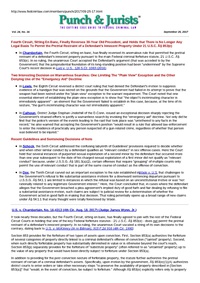This decision is noted for the Eighth Circuit’s emphatic rejection of the Government’s claimed use of the “plain view” exception to the Fourth Amendment’s warrant requirement, because of the Government’s failure to prove one of the critical (but often overlooked) elements of that exception - namely that the object’s …
Few components of the Federal Sentencing Guidelines are more mystifying or can produce weirder results than the concept of “relevant conduct” - a concept that Judge Newman of the Second Circuit once called "perhaps the single most objectionable feature of the current guidelines." Jon O. Newman, “Five Guideline Improvements,” …
In 1992, the Supreme Court issued its ruling in Wade v. United States, 504 U.S. 181 (1992), in which it generally limited judicial review of prosecutorial decisions involving the Government's refusal to file a motion seeking a downward departure for substantial assistance under U.S.S.G. § 5K1.1 to instances where …
Another of the many exceptions to the general rule that warrantless searches are per se unreasonable is the “emergency aid” doctrine, which has been described by the Supreme Court as follows:
“Law enforcement officers may enter a home without a warrant to render emergency assistance to an injured occupant …
It took nearly three decades, but the Fourth Circuit, sitting en banc, has finally agreed to join with the rest of the Federal Circuit Courts in holding that one of the key Federal forfeiture statutes - 21 U.S.C. § 853(e) - does not permit the pretrial restraint of a …
